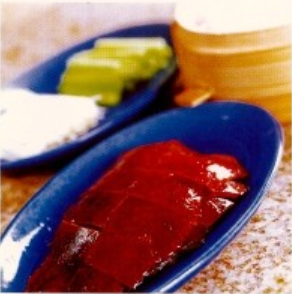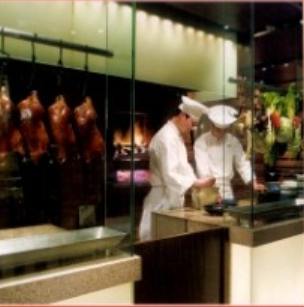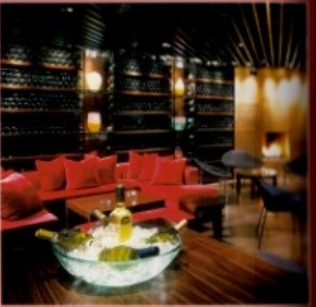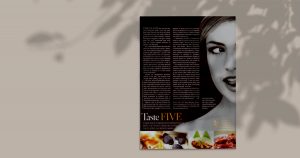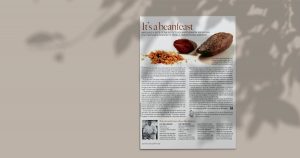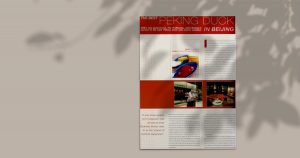Article
Kee Magazine,
No. 11 Fall 2004
THE BEST PEKING DUCK
in Beijing
“It was sheer poetry and I believed I had
arrived at what Buddhist Monks refer
to as the “planet of extreme happiness”.
I Have enjoyed the pleasures of Peking Duck on many occasions during visits to Beijing over the last 10 years. Authentic Peking Duck, in my mind, qualifies as one of mankind’s great culinary achievements. Until recently, my favourite restaurant to appreciate this culinary wonder by far used to be the venerable and famous 150-year-old Quan Ju De. But recently, I had the extreme good fortune to tuck into Chef Kent Jin’s exquisitely prepared Peking Duck at the new “Made in China” restaurant at the Beijing Grand Hyatt.
A warm feeling of gladness started to develop inside of me when I sampled Chef Jin’s sublime creation. It was sheer poetry and I believed I had arrived at what Buddhist Monks refer to as the planet of extreme happiness:
The convivial Chef Jin, whose face exudes the Confucian virtues of benevolence and courtesy, explained to me that he follows a centuries-old Beijing recipe, to which he adds a few of his own trade secrets. The downside of duck, as even duck aficionados have to admit, is that it is one of the fastest birds on the planet. Miraculously, Chef Jin’s duck has crackling skin and tender, flavour-rich flesh with no fatty taste – a spectacular feat of culinary sleight of hand. His secret is to fill the duck’s cavity with marinated plum water and some air pressure. This allows the bird to swell so that air is trapped between the skin and the flesh. During the roasting process, the fat escapes through the skin, leaving it crispy and the flesh moist and plum-infused. Coating and blow-drying the duck are also part of his mysterious ways.
I was so impressed by my discovery that I promptly returned to the restaurant the very next day accompanied by my friend, Chen Xuemin, who along with Professor Li Ming, must count among Beijing’s most notable gastronomes. He was adamant in his conviction that it was not even remotely possible to improve on Quan Ju De’s Peking Duck. Upon sampling Chef Jin’s duck, however, he took a deep breath and stated in reverent tones, which should accompany a pronouncement of this magnitude, “This is the best Peking Duck in Beijing”. At that moment, the waiter, his voice pregnant with awe, told Xuemin: “Do you realize that this man next to you ate a whole duck last night?” In my own defense, I have to say that I had no idea that I had devoured an entire duck the night before. The delightfully de-boned dish had appeared almost dainty.
Chef Jin and his team serve their heavenly duck in a sleek yet cosy setting. It is as if authentic northern Chinese kitchens are brought to the diner’s every table. The duck ovens form the focal point of the restaurant and much to my delight, are visible behind sleek glass panels, where cherry and pearwood are used to fire the oven. The wok and dumpling workstations are also visible to those who are interested to see how the chefs perform their culinary kung fu. In addition, authentic Chinese teapots and other working utensils decorate the walls whilst not in use. The super slick surroundings are the work of “Super Potato”, one of Beijing’s most contemporary design studios.
“Made in China” represents the best of the Beijing culinary scene. Upon my next visit to the city, I shall stay at the Grand Hyatt simply in order to eat there. The most civilized of all Chinese greetings says “Have you eaten yet?” To this question, my five-year-old honorary nephew in Beijing (a gourmet in the making), after dining at this establishment last week, replied,” have eaten well at Made in China.” Long may it reign.
